Joe Biden defeated Bernie Sanders in Florida, Illinois and Arizona, NBC News projected Tuesday, opening up a nearly insurmountable delegate lead.
In Ohio, polls were ordered closed as a public health measure after a judge declined the governor's request to postpone the election. But contests in the other three states proceeded as scheduled Tuesday despite widespread fears over the rapidly spreading coronavirus pandemic.
The outbreak, which has sickened more than 5,000 people in the U.S., is thrusting the Democratic primary into uncertainty, with some states postponing their elections and the candidates forgoing rallies for virtual events.
Highlights from the March 17 Democratic primaries:
- Key takeaways from the night: Biden marches toward the nomination.
- President Donald Trump officially became the Republican presumptive nominee.
- Here's what states are doing to limit coronavirus risks.
Biden, Sanders campaigns ramping down ad spending amid coronavirus spread
WASHINGTON – With the coronavirus outbreak prompting several states to postpone their primary elections, former Vice President Joe Biden and Vermont Independent Sen. Bernie Sanders are slowing their ad spending to a virtual halt.
A Biden campaign spokesman told NBC News there is “no plan right now” to go up with TV or radio ads, largely because their ad strategy focuses on creating ads based on the issues voters in that upcoming primary state find to be most important. Facebook's ad-tracker shows the campaign is still running digital ads on the platform, however.
That same tracker shows that Sanders isn't currently running any Facebook ads. And data from Advertising Analytics shows that the Sanders campaign is dark on traditional media too (television and radio).
As the Biden campaign continues to iron out the best ways to campaign in this unprecedented time for presidential politics, the spokesman caveated that their current plan for remaining silent on the airwaves could change. One area where investments could be made is in digital ads now that most people are turning to video websites like YouTube and Hulu while they work from home.
Biden ads featured in states from Michigan to Georgia featured President Barack Obama thanking Biden for his commitment to “Service” and Biden’s call for Democrats to unite in an ad called “Always” to defeat President Donald Trump. They also rolled out new Spanish-language ads in Florida, Arizona and Illinois discussing Biden’s records on guns, healthcare and the need for leadership to prevent future global panic like the one caused by coronavirus.
Unite the Country, the Super PAC supporting Biden’s candidacy, will also not be on the airwaves or on digital in the coming weeks as they focus on expanding their group with sights set on the general election, Steve Schale, a top strategist for the group, told NBC News.
After projected losses in the Florida, Illinois and Arizona primaries on Tuesday night, Sanders' campaign manager, Faiz Shakir, said in a statement that Sanders "is going to be having conversations with supporters to assess his campaign" but that "In the immediate term, however, he is focused on the government response to the coronavirus outbreak and ensuring that we take care of working people and the most vulnerable."
Through March 10, before the campaign was completely upended by coronavirus, the Sanders campaign had significantly outspent the Biden campaign on the television and radio airwaves—$42.2 million to $14.6 million respectively.
—Mike Memoli contributed.
Chicago's voting struggles illustrate the challenges of coronavirus
Chicago voters were turned away for hours at dozens of polling locations that opened without voting machines, adequate cleaning supplies or enough poll workers — acutely illustrating the strain of voting under the threat of coronavirus exposure and mandates for social distancing and disinfecting surfaces.
The delays were driven by a shortage of poll workers and the need to move polling equipment to new locations, Noah Praetz, a former director of elections at Cook County, told NBC News, adding that "probably 60 percent of necessary poll workers” handled things.
After 200 polling locations were changed, about 50 precincts didn’t have enough supplies to open, James P. Allen, a spokesman for the city's elections board, told reporters. Locations struggled to find enough workers and went through a large number of replacement judges, he said. By Monday, the number of resignations from judges had risen to “a torrent, a tsunami of calls,” Chicago Board of Elections Chair Marisel Hernandez said.
At the end of the day, turnout was slightly over 30 percent in the city in what were “extremely challenging conditions,“ the city’s elections board reported — a steep drop from over 50 percent turnout in 2016 and only a few percentage points above the city’s record-low presidential primary turnout in 2012.
Efforts to push alternate means to in-person voting like early voting and voting by mail appeared successful Tuesday, with nearly 600,000 early votes cast and nearly 300,000 ballots sent by mail across the state, compared to about 423,000 early votes and 162,000 mail-in ballots in the 2016 primary, according to the Illinois State Board of Elections.
Longtime anti-abortion rights Democrat Rep. Lipinski defeated in Chicago-area primary
Anti-abortion rights Democratic Rep. Dan Lipinski was ousted on Tuesday night by progressive challenger Marie Newman in a high-profile primary in Illinois, giving liberals a glimmer of hope in what otherwise has been a dispiriting election year for them.
Lipinski had successfully fought back numerous challenges on his left flank, including one from Newman in 2018. But he finally succumbed Tuesday when the Associated Press called the rematch for Newman, who garnered 47 percent of the vote to Lipinski's 45 percent, with two lesser-known candidates splitting the rest.
Lipinski, who in 2005 inherited his Chicago-area seat from his father, longtime former Rep. Bill Lipinski, has drawn the ire of a wide range of progressive groups for his votes and policy statements on abortion, health care and other issues.
Read the full story here.
ANALYSIS: Sanders' coronavirus pitch flopped. Was it the message or the messenger?
Bernie Sanders says the coronavirus pandemic highlights the need for the populist progressive political revolution he's been promoting for five years. Democrats aren't buying it.
The vast majority of them trust front-runner Joe Biden to handle a crisis more than they trust Sanders, according to NBC News polls in a series of states that held presidential primaries Tuesday. In Florida, 71 percent of voters picked Biden on that question, while 64 percent did in Illinois and 63 percent did in Arizona.
The question now for progressives is whether it's their message or their messenger, Sanders, that Democrats are rejecting as the centrist Biden moves ever closer to winning the party's nomination and President Donald Trump pushes a coronavirus stimulus package that features a populist plan to send thousand-dollar checks to Americans.
Read the analysis here.
FIRST READ: After Tuesday's losses, Sanders faces more questions about his campaign's future
Under normal circumstances, there would be enormous pressure for Bernie Sanders to suspend his presidential campaign and unite — now that he trails Joe Biden by 315 pledged delegates, and that he continues to underperform from his 2016 campaign.
But these aren’t normal circumstances.
With more than 5,700 confirmed coronavirus cases in the United States, with at least 100 deaths, and with states (including Ohio yesterday) postponing their primaries until May or June, the interest isn’t party unity.
It’s the country’s health.
Get First Read.
Sanders to 'assess' campaign
Sen. Bernie Sanders plans to assess his 2020 presidential campaign with his supporters after losing primaries in three states on Tuesday, his campaign manager, Faiz Shakir, said in a statement Wednesday morning.
“The next primary contest is at least three weeks away," Shakir said following Sanders' losses in Florida, Illinois and Arizona to former Vice President Joe Biden, according to NBC News' projections. "Sen. Sanders is going to be having conversations with supporters to assess his campaign.”
“In the immediate term, however, he is focused on the government response to the coronavirus outbreak and ensuring that we take care of working people and the most vulnerable,” Shakir continued.
Read the story here.
NBC News Primary Poll: Voters who oppose 'Medicare for All' boost Biden in Arizona
Joe Biden beat Bernie Sanders to win the Arizona Democratic primary with support from voters who said the next president’s policies should return to former President Barack Obama’s, according to results from an NBC News Primary Poll.
Biden also got support from those who said they oppose "Medicare for All," a key piece of Sanders' platform, and those who said the qualities that matter most to them in a candidate are someone with the right temperament and someone who can unite the country.

Biden also won the Arizona primary with support from groups that have been strongholds for him — voters age 45 and above and those who identify as moderate or conservative.
Biden wins Arizona primary to cap three-state sweep, NBC News projects
Biden wins the Arizona Democratic primary, NBC News projects, capping a sweep of contests in three states on Tuesday.
The trio of wins allowed the former vice president to grow his lead in the total delegate count over Sanders and tighten his grip on the Democratic presidential nomination.
With 62 percent of the vote in Arizona in, Biden led Sanders 44 percent to 31 percent.
There are 67 pledged delegates at stake in Arizona. As of 11:15 p.m. ET, Biden had received 23, while Sanders was awarded 19, according to NBC News.
Earlier in the night, Biden defeated Sanders in the Florida and Illinois Democratic primaries, according to NBC News projections, allowing Biden to open up what could be an insurmountable delegate lead in the battle for the nomination.
As of of 11:15 p.m ET, an NBC News projection of the total delegate count showed Biden leading Sanders 1,124 to 815.
To win the nomination on the first ballot, a Democratic candidate must receive support from a majority of pledged delegates — at least 1,991.
Key takeaways from Florida, Illinois: Biden cruising to the nomination
WASHINGTON — Joe Biden won dominant victories in Florida and Illinois on Tuesday as he marched closer to the Democratic presidential nomination amid coronavirus mayhem.
The former vice president was on course to expand his lead and cross the halfway mark toward the 1,991 delegates needed to clinch the nomination on the first ballot.
The primaries came as the coronavirus outbreak wreaked havoc on American life and sent the economy into a tailspin, though large numbers of votes had already been banked in the early voting period. Arizona polls were set to close later. Ohio postponed its primary at the last minute.
WATCH: Kornacki breaks down Biden's victory in Illinois
Biden appeals to Sanders supporters, discusses pandemic in somber victory speech
Biden, in a solemn online address to supporters, quietly welcomed his primary wins in Florida and Illinois by praising Sanders and explicitly reaching out to the Vermont senator's youthful supporters.
“To the young voters” who have gravitated toward Sanders, Biden said, “I hear you, I know what’s at stake.”
“Senator Sanders and I may disagree on tactics, but we share a common vision,” Biden said, before listing off several policy priorities he said he shared with Sanders, including “affordable health care” and “tackling the existential challenge of climate change.”
In brief remarks that largely focused on the national response to the coronavirus pandemic, Biden said it was “important for us to get through this crisis protecting both the public’s health and our democracy.”
“Tackling this national epidemic is a national emergency akin to fighting a war,” he said.
Biden thanked poll workers and public health experts for allowing the polls to remain open in Illinois, Florida and Arizona, and said that, “today it looks like once again … our campaign has had a very good night.”
Biden made his address from his hometown of Wilmington, Delaware. Supporters and reporters were able to watch the remarks via live stream. Biden, like Sanders, has in recent days made all campaign events “virtual events” to help slow the spread of coronavirus.
NBC News Primary Poll: Arizona's Latino voters split between Biden and Sanders
Latino voters made up 27 percent of the electorate in Tuesday's Arizona Democratic primary, and they were split between Joe Biden and Bernie Sanders, according to results from an NBC News Primary Poll.
Forty-five percent of Arizona's Latino voters said they planned to support Biden, while 44 percent said they planned to support Sanders.
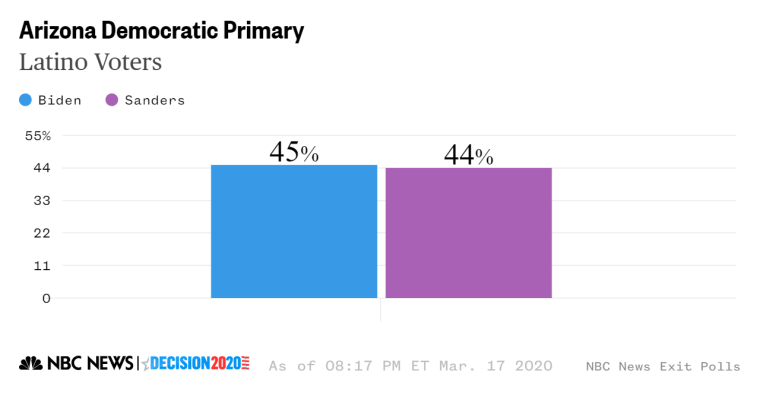
Among the state's Latino voters, 52 percent said the issue that mattered most to their vote is health care, followed by income inequality, race relations and climate change. Arizona's white voters were less likely to choose health care as the most important issue (44 percent), the poll found.
A majority of Latino voters in the state also said they support replacing private health insurance with a single government plan for everyone, a notable part of Sanders' platform.
Fifty-four percent of Arizona's Latino voters identify as liberal; 46 percent identify as moderate or conservative. More of these voters are age 45 or older (57 percent) than are under 45 (43 percent).
Arizona too early to call, NBC News projects
Arizona's Democratic primary is too early to call, NBC News projects.
As of 10 p.m. ET, NBC News has projected Biden the winner in Florida and Illinois. He now holds a commanding delegate lead of nearly 300 points and is more than halfway to clinching the Democratic presidential nomination.
Arizona sees high voter turnout despite coronavirus fears
The number of in-person voters in Maricopa County taking part in the state’s Democratic presidential preference primary today has surpassed the number who took part at the county level for the 2016 Democratic presidential preference primary, Maricopa County Elections Department spokeswoman Megan Gilbertson told NBC News.
Maricopa County accounts for more than half of the state’s registered Democratic voters. This is especially notable because the Democratic race was more competitive in and the high Democratic turnout took place despite coronavirus concerns and despite the county closing one-third of its polling locations over the weekend.
Biden wins Illinois, NBC News projects
Biden defeated Sanders on Tuesday in the Illinois Democratic primary, NBC News projects.
That's more good news for the former vice president, with NBC News projecting a big win for him in Florida over Sanders earlier in the evening. Results from Arizona's primary are still to come.
According to the NBC News delegate count, Biden is now more than halfway to clinching the Democratic presidential nomination and has surpassed 1,000 delegates.
NBC News Primary Poll: Older, moderate and black voters drive Biden's win in Illinois
Joe Biden won Illinois' Democratic primary on Tuesday, beating Bernie Sanders with support from groups that have helped Biden claim other primary victories this year, according to an NBC News Primary Poll.
In Illinois, Biden won the support of voters age 45 and older, those who identify as moderate or conservative and black voters.
He also won the support of Illinois voters who oppose Medicare for All, as well as those who said the quality that matters most in a candidate is someone who can unite the country and voters who said they are very concerned about the effects of the coronavirus outbreak.

Biden opens up commanding delegate lead over Sanders
WASHINGTON — Joe Biden is poised to walk away from Tuesday's primaries with a nearly insurmountable delegate lead over Bernie Sanders after winning Florida, one of the biggest states of the primary calendar, according to NBC News projections.
The former vice president now has 269 more delegates than the Vermont senator, 1,047 delegates to Sanders' 778, as of 9:00 p.m. ET.
Biden is now past the halfway mark to the 1,991 delegates he would need to win a majority of all delegates, and thus capture the Democratic presidential nomination.
Read the full story here.
Trump is now the presumptive GOP nominee, NBC News projects
President Donald Trump is the Republican Party's presumptive presidential nominee, NBC News projects.
NBC News made the call after projecting Trump the victor in the Florida and Illinois Republican primaries.
Those projected wins put him over the threshold of delegates needed to officially become the party’s nominee.
NBC News Primary Poll: 1 in 5 Sanders voters in Illinois can’t guarantee they’ll support Democratic nominee
One in 5 supporters of Bernie Sanders in Illinois can’t guarantee that they will vote for the Democratic Party’s presidential nominee in November, regardless of who that may be, according to results from the NBC News Primary Poll.
In contrast, just 6 percent of Joe Biden’s supporters in Tuesday's Illinois Democratic primary said the same.

Sanders tackles coronavirus in primary night speech
Sen. Bernie Sanders, I-Vt., on Tuesday outlined his coronavirus proposals in a speech from his campaign headquarters in Washington, D.C. — items that include sending households $2,000 a month for the duration of the crisis.
Sanders opened his address by saying the country was "facing an unprecedented series of crises" that he believes will require a $2 trillion stimulus to avoid "economic catastrophe."
His lengthy list of proposals included government covering all coronavirus-related medical bills, speed up testing, invoke emergency powers to scale up production of supplies like surgical masks and ventilators, and provide substantial unemployment insurance to those who lose jobs as a result of the outbreak.
Sanders enters Tuesday's primaries trailing frontrunner Joe Biden in the NBC News projected delegate count.
NBC News Primary Poll: Biden wins Florida with support from older, moderate and black voters
Joe Biden won Florida's Democratic primary Tuesday night with help from his core constituency: voters age 45 and older, black voters and voters who identify as moderate or conservative.
Biden also won 83 percent of voters who said the quality that matters most in a candidate is someone who can unite the country, according to an NBC News Primary Poll. The NBC News Decision Desk projected at 8 p.m. ET, when polls closed, that Biden would beat Bernie Sanders in the Florida primary.
Biden was also the clear favorite among Florida voters who oppose Medicare for All, as well as those who want to return to former President Barack Obama’s policies.

Biden wins Florida, NBC News projects, but Illinois to early to call
Joe Biden wins the Florida Democratic primary, NBC News projects.
The Illinois Democratic primary is too early to call, according to NBC News.
With 77 percent of the Florida vote counted, Biden led Sanders 61 percent to 23 percent.
In Florida, 219 pledged delegates are up for grabs, making it the biggest prize of the contests on Tuesday night.
As of 8:10 p.m., Biden had received 126 of the state's delegates, while Sanders was awarded 17, according to NBC News.
In Illinois, 155 pledged delegates are at stake.
NBC News Primary Poll: Democratic voters want a candidate who can beat Trump
In line with other Democratic primary contest this year, a majority of voters on Tuesday across Florida, Arizona and Illinois said they would rather see the Democratic Party nominate a candidate who can beat President Donald Trump over someone who agrees with them on the issues, according to results from the NBC News Primary Poll.
In Florida, 66 percent of Democratic primary voters said they would rather someone who can beat Trump, compared to 65 percent in Arizona and 61 percent in Illinois.
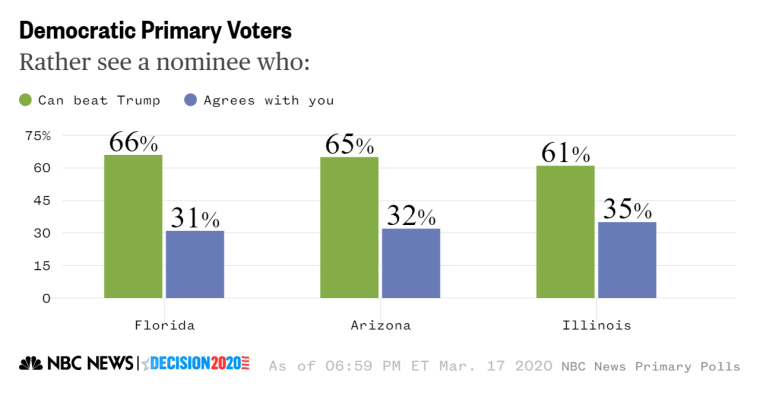
Voters under 45 in those three states were more split than those over 45. Still, the majority of younger voters, too, said they preferred a candidate who can beat Trump.
NBC News Primary Poll: Florida voters trust Biden over Sanders to handle Social Security
A majority of Florida Democratic primary voters trust Joe Biden more than Bernie Sanders to handle Social Security, according to an NBC News Primary Poll.
Fifty-nine percent said they would trust Biden to handle Social Security, while 37 percent said they would trust Sanders.
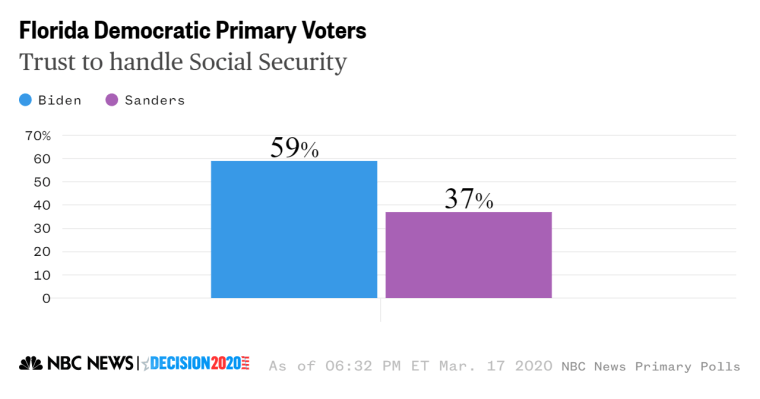
NBC News Primary Poll: On immigration policy, Arizona voters nearly divided on whether to trust Biden or Sanders
Just over half of Arizona Democratic primary voters said they would trust Joe Biden more than Bernie Sanders to handle immigration policy, according to an NBC News Primary Poll.
Fifty-one percent said they would trust Biden, while 43 percent said they would trust Sanders.
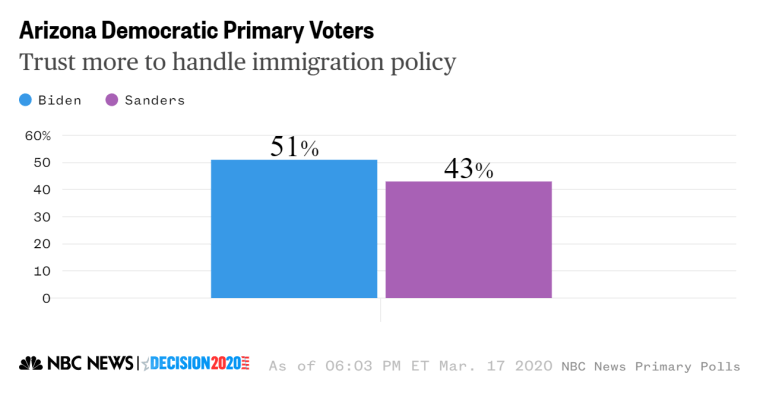
DNC urges states to stick to primary schedule, adopt vote-by-mail instead
The Democratic National Committee is urging states with upcoming presidential primaries and caucuses to not reschedule their elections and instead adopt vote-by-mail in response to the coronavirus outbreak.
At least six states have so far have taken steps to postpone their primary contests as cities and states shut down amidst the pandemic, but the DNC instead said states should not bring "our democratic process to a halt" and allow people to vote early or by mail on the currently scheduled dates, since no one knows when the threat of the pandemic will subside.
"Eligible voters deserve certainty, safety, and accessibility," DNC chairman Tom Perez said in a statement.
Perez said the easiest way to allow people to vote during the crisis would be mail-in-balloting, as well as no-excuse absentee voting, where a voter can drop off their completed ballot at a central location, or expanded days and hours for in-person voting to reduce lines.
Slightly more than half the states in the union have yet to vote in the Democratic presidential primary and all are required to select delegates to July's Democratic National Convention by June 20, under party bylaws.
States that don't comply with the rules can be penalized by having their slate of delegates diminished or even cut entirely. But Perez said the DNC may allow some "flexibility" in the process, given the extraordinary circumstances.
“The DNC will continue to monitor the situation and work with state parties around their delegate selection plans, specifically allowing flexibility around how states elect their delegates to the national convention once those delegates are allocated based on their primary or caucus results," Perez said.
NBC News Primary Poll: Florida voters trust Biden over Sanders to handle gun policy
A majority of Florida Democratic primary voters trust Joe Biden more than Bernie Sanders when it comes to handling gun policy, according to results from an NBC News Primary Poll.
In a state that has seen multiple mass shootings in recent years, 63 percent trust Biden to handle gun policy more than they trust Sanders; 27 percent trust Sanders more.
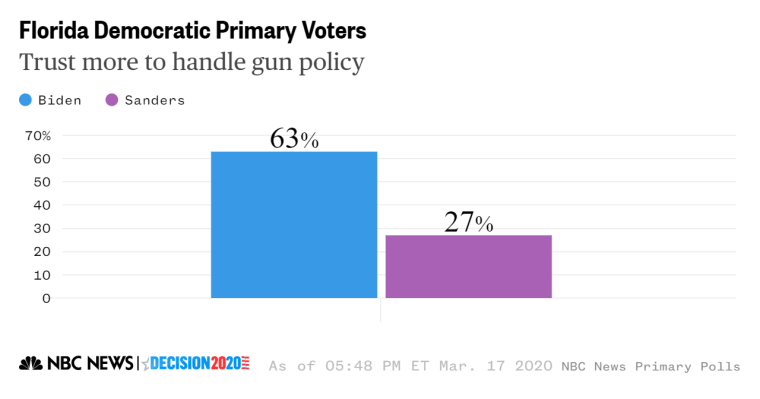
NBC News Primary Poll: Most Illinois voters worried about direction of economy
Most Illinois Democratic primary voters are worried about the direction of the nation’s economy in the next year, according to an NBC News Primary Poll.
Eighty-two percent said they are worried about the direction of the national economy, including 46 percent who are very worried about it. Eighteen percent said they are not worried.
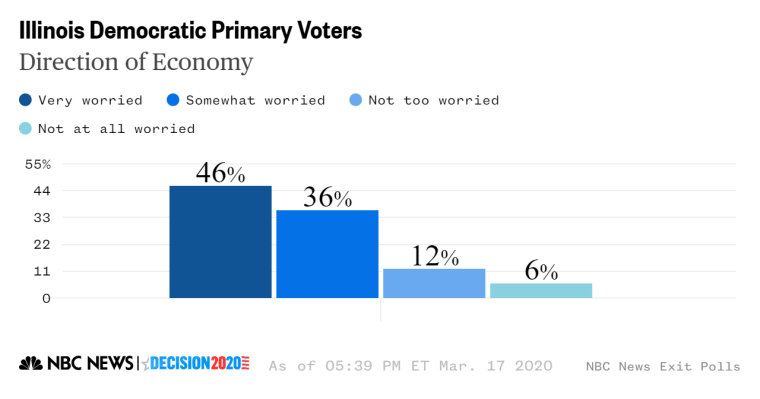
NBC News Primary Poll: Majority of Illinois voters very concerned about coronavirus outbreak
An overwhelming majority of Illinois Democratic primary voters said they are concerned about the effects of the coronavirus outbreak, according to an NBC News Primary Poll.
Eighty-seven percent of Illinois voters said they are concerned about the outbreak, including a 53 percent majority who said they are very concerned.
Only 13 percent said they are not concerned about the effects of the outbreak.
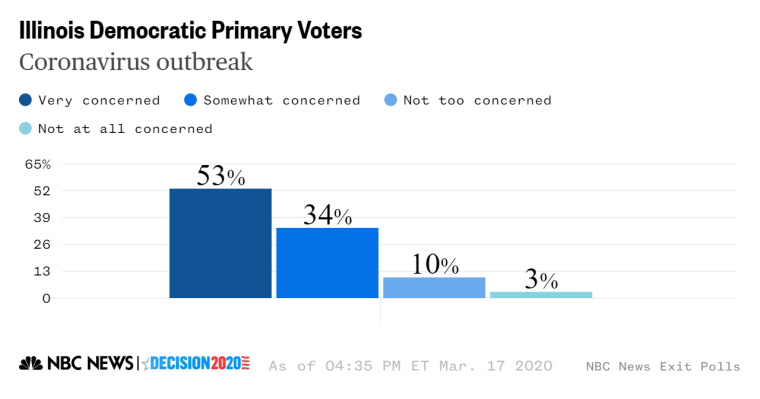
Among those who are concerned, 65 percent are 45 or older, and 35 percent are under 45.
NBC News Primary Poll: Voters trust Biden over Sanders to handle a major crisis
In the midst of the coronavirus outbreak, majorities of voters in the Florida, Illinois and Arizona Democratic primaries said they trust Joe Biden over Bernie Sanders to handle a major crisis, according to NBC News Primary Poll results.
Seventy-one percent of Florida voters, 64 percent of Illinois voters and 63 percent of Arizona voters said they would trust Biden more than Sanders to handle a significant crisis.
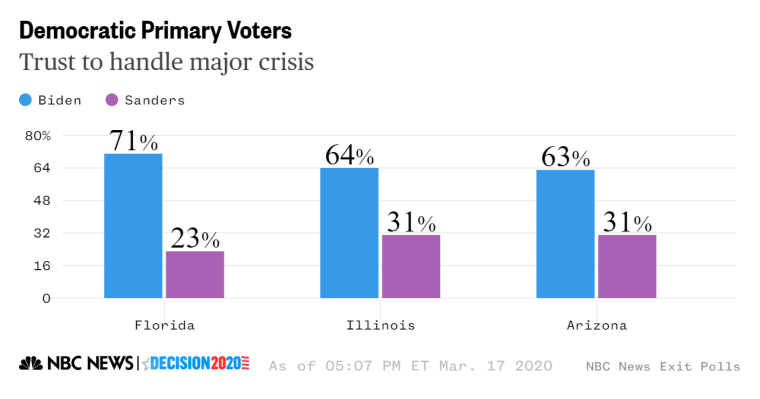
Despite low turnout, Biden camp says early voting making for legit numbers overall
With hours to go until polls close in Arizona, Florida and Illinois, the Biden campaign is downplaying any concern that low in-person turnout because of the coronavirus outbreak is not representative of the electorate, pointing to early voting numbers to back their point.
“While voter turnout on election day itself may be lower due to COVID-19 concerns, we believe that, with early vote and vote by mail, overall turnout will be roughly on pace for 2016 in Arizona and Florida and roughly on pace for 2018 in Illinois, and that voter turnout in all three states will reflect the population at large,” spokesperson Kate Bedingfield wrote in a campaign memo.
Pointing to a mix of internal and publicly available early voting data, Bedingfield wrote that Biden's campaign believes it will still “emerge tonight with a bigger delegate lead than we had going into the night." The memo says early voting numbers in the three states are far higher than in 2016.
Arizona senior forced on odyssey after polling place closed
As pandemic throws elections into chaos, advocates call for national vote-by-mail
Calls are growing for states to expand voting-by-mail options ahead of the November election as the coronavirus pandemic has disrupted in-person voting in primary elections across the country.
Sens. Amy Klobuchar, D-Minn, and Ron Wyden, D-Ore., introduced a bill Monday that would mandate emergency mail-in-voting in all states and the Brennan Center for Justice recommended officials consider "a universal vote-by-mail option” as they respond to the crisis.
The progressive advocacy group Stand Up America, meanwhile, on Tuesday launched a six-figure campaign to pressure Congress to expand vote-by-mail options, the group told NBC News.
The group is running digital ads, sending text messages to the 400,000 people on its SMS list, and creating videos and other social media content to encourage Americans, many of whom are now stuck at home, to call their members of Congress. The campaign has generated about 17,400 calls to Congress within the first few hours.
Primary elections scheduled for Tuesday have created confusion and other issues, with Ohio abruptly closing its polls, despite a court order to the contrary, and Chicago election officials sparing with the state's governor over whether to keep election going as they reported extremely low turnout.
So far, in addition to Ohio, Georgia, Puerto Rico, Louisiana, Wyoming, Maryland and Kentucky have postponed their primaries or canceled in-person attendance.
Washington, the hardest-hit state by COVID-19 outbreak, was able to proceed with their primary last week in part because it votes entirely by mail, state officials said. The state is one of four — along with Oregon, Hawaii, and Colorado — that have transitioned entirely to mail-in balloting, while the vote-by-mail has increased across the country as more states provide it as an option to voters.
Advocates, who have long argued that sending ballots to voters increases participation in elections, say concerns about crowded places have made the need for remote voting more urgent than ever.
Early voter turnout around Chicago 'remarkably low,' elections official says
Some measures of Chicago-era voting are showing very low turnout compared to previous elections.
Just over 10,000 Chicago voters had cast a ballot in the first hour of voting, said James Allen, a spokesperson for the city board of elections in a call with reporters on Tuesday.
“We had extremely low turnout,” Allen said, adding, “We also suspect there is a lot concern about going to any public place with more than 10 people."
In nearby DuPage County, fewer than 45,000 voters had cast their ballots as of noon Tuesday, the county said, on pace for a sharp decline from its turnout last election. The county already had nearly 49,000 recorded ballots cast in early voting or by mail; in the 2016 primary, it recorded almost 290,000 total votes.
Tuesday's results were "remarkably low,” said Matt Dietrich, spokesperson for Illinois' board of elections. He expects similar results statewide. “When we get the official numbers, I seriously doubt that we’re going to have anything close to the 33 percent average that we’ve had since 2000 in presidential primaries,” he told NBC News.
Chicago's board of elections had called for Illinois to delay of its primary amid the coronavirus outbreak, Allen said. But Dietrich said state law only allows such a delay by a lawsuit, something the state board was not inclined to pursue.
Illinois Gov. J.B. Pritzker's press secretary said Tuesday that the governor did not want to "risk confusion and disenfranchisement in the courts." "No one is saying this is a perfect solution," his press secretary, Jordan Abudayyeh, said. "We have no perfect solutions at the moment. We only have least-bad solutions."
A note about NBC News polling for Tuesday's primaries
Because of the coronavirus outbreak, the National Election Pool did not conduct in-person exit polls for Tuesday's primaries.
Instead, the National Election Pool, which includes NBC News, conducted a primary poll — a survey of voters conducted by telephone before Tuesday's vote. The survey asked who respondents would vote for and included questions to help explain voter attitudes and demographics, as an exit poll would.
Check back throughout the night for results from the NBC News Primary Poll.
Biden encourages mail-in or curbside voting
5 things to watch as Arizona, Florida and Illinois vote during coronavirus mayhem
Democrats in three states will hold primaries Tuesday in the first big day of voting since the coronavirus upended vast swaths of American life and was declared a national emergency.
It is uncharted territory for Arizona, Florida and Illinois, which collectively award 441 delegates to the Democratic convention, more than one-fifth of what’s needed to clinch the nomination. Joe Biden leads Bernie Sanders by about 150 delegates, according to the latest NBC News count.
Here are five things to watch for on Tuesday.
Tuesday's pandemic primaries: Everything you need to know
Three states are holding Democratic primaries Tuesday -— the first since the coronavirus was declared a pandemic and a national emergency, paralyzing much of the country with shutdowns.
There were initially four states slated to vote, but Ohio's primary was called off Monday night after Gov. Mike DeWine filed suit to block it, citing concerns that poll workers could be exposed to the virus.
The St. Patrick's Day primaries are also the first since Joe Biden and Bernie Sanders faced off in a stripped down, one-on-one debate in Washington, D.C., on Sunday night.
Sanders faces an uphill battle in Tuesday's states — Hillary Clinton won all three while running against him in 2016, and won Ohio as well. Polling shows a possible Biden sweep.
Here's a look at what you need to know.
Democrats vote in Florida and more: What polls show for Biden, Sanders
Democrats are scheduled to vote in primaries for their presidential nominee in three states Tuesday, despite the coronavirus crisis that has locked much of the country in a standstill.
The pandemic's influence is already being felt in the electoral process — Ohio was supposed to be among the states where voting was happening Tuesday, but the primary was called off Monday night because of the health emergency. (Polling shows Joe Biden was poised for a big win in Ohio. An NBC News/Marist poll released Monday found likely Democratic primary voters supporting the former vice president over Bernie Sanders by a wide margin, 58 percent to 35 percent.)
Here's what the latest polling shows in the three states that are still going to the polls — and where 441 delegates are up for grabs.
Strengths and weaknesses of 5 possible Biden running mates
Joe Biden has vowed to choose a woman as his running mate if he's the Democratic presidential nominee. Here's a look at a shortlist of frequently mentioned potential candidates — each of whom would bring something different to the ticket.
It just depends on what the former vice president is looking for — age, ideology, race, experience and geography could all matter.
While Maryland delays primary, special election to replace Cummings will stay mail-in only
WASHINGTON — As Maryland delays most primary elections from late April to early June in response to the coronavirus outbreak, the state will not push back the special election aimed at replacing the late Rep. Elijah Cummings.
Instead, that election will go on as scheduled, but all voters will cast their ballot by mail.
Maryland Republican Gov. Larry Hogan made the announcement Tuesday as part of the larger decision to shift the state's primary elections from April 28 to June 2. He directed the state elections board to come up with a plan to conduct a June primary "in a way that protects public health and preserves the integrity of the democratic process."
Read more here.
Primary states voting Tuesday take steps to limit coronavirus risks
The blue painter’s tape issued to poll workers in Cook County, Illinois, has a particularly important use this year: marking off 6-foot increments to make sure people maintain a safe distance from one another.
“It is our job to ensure the safety of those around us while we carry out our civic duty today,” tweeted County Clerk Karen Yarbrough.
Arizona, Florida and Illinois are proceeding with Tuesday’s primaries, but officials are stressing alternatives, such as voting by mail, and telling voters to be on the lookout for changes due to coronavirus precautions.
Polling places are also taking their own precautions.
Read the full story here.
.
Sanders urges voters to stay safe
FIRST READ: The 2020 Democratic race could be frozen in place after Tuesday's primaries
It’s likely — if not certain — that tonight’s Democratic presidential primaries in Arizona, Florida and Illinois will be the last ones for the next two months.
And it’s unclear what, exactly, is going to happen today in Ohio, where the state’s governor said he wouldn’t open the state’s polling places, defying a judge who declined to postpone the state’s primary.
It all freezes into place a Democratic nominating contest — with uncertainty about when it all begins again.
And that raises questions about the state of Bernie Sanders’ campaign (given that Joe Biden’s lead is going to grow after tonight’s contests), about the Democratic convention in July (will the health landscape improve by then?), and about whether states and the federal government can institute a vote-by-mail system for November.
Get the rest of First Read.
Maryland postpones primary election slated for April to June
Maryland Gov. Larry Hogan announced Tuesday that he's postponing his state's primary that was scheduled for April 28 to June 2.
"I am issuing a proclamation to postpone the April 28 primary to June 2, just as a number of other states have done and as other governors are expected to do later today or in the days ahead," he said at a press conference.
"I am directing the state board of elections to develop a comprehensive plan by April 3 to conduct the primary election in a way that protects public health and preserves the integrity of the democratic process in our state," he said.
Pandemic politics: Coronavirus forces candidates to shift to 'virtual' campaign
With the coronavirus pandemic wreaking havoc on stock markets, sports leagues and everyday life, it comes as no surprise that the presidential race isn't being spared.
Enter: the virtual campaign.
Say goodbye to big rallies with long lines, smaller meet-and-greets, volunteers knocking on your door. All you'll need now to "attend" your favorite candidate's event is an internet-connected device — please do so in your pajamas if you like.
Faced with the very real and rapidly growing fear about the spread of the coronavirus, the remaining candidates — Donald Trump, Joe Biden and Bernie Sanders — are doing everything they can to keep their supporters excited without doing so in the large venues that public health experts say is where the virus can be easily spread.
Ohio primary called off at last minute due to health emergency
Ohio's Tuesday primary was called off at the last minute on Monday night due to a health emergency posed by the coronavirus.
The election was thrust into chaos on Monday after Gov. Mike DeWine said the state would not open polls because of the coronavirus outbreak. His comments come after a judge declined to postpone the contest until June.
"During this time when we face an unprecedented public health crisis, to conduct an election tomorrow would force poll workers and voters to place themselves at an unacceptable health risk of contracting coronavirus," DeWine said in a statement posted to Twitter.
DeWine said that state Health Department Director Amy Acton would "order the polls closed as a health emergency." Acton did just that late Monday night.
Read the full story here.
Latino voters to show electoral clout in Florida, Arizona Democratic primaries
MIAMI — In the months leading to the presidential primaries Tuesday in Florida and Arizona, the names Fidel Castro and Joe Arpaio have become part of the mix for Latino voters as they choose between Joe Biden and Bernie Sanders.
But the escalating coronavirus pandemic has made the issues surrounding the late Cuban communist leader and the ex-sheriff of Maricopa County, Arizona, secondary to whether to venture to the polls at all.
Florida and Arizona, as well as Illinois are going forward with their primaries despite the national emergency over the outbreak; Ohio's is postponed.
Latinos make up 20.5 percent of eligible voters in Florida and 23.6 percent in Arizona, according to the Pew Research Center.



















